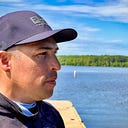Member-only story
Fish Tale
For as long as I can remember, I have always loved and respected nature. For most of my life, however, nature was a place that existed away from my normal, daily life. It was a place I visited on weekends or on vacations. After moving to the woods, however, I have a deeper understanding that nature is not some place we visit; it is our home.
We grew from nature. No matter our beliefs, we must admit our ancestors lived in a less modern, more natural world. Scientific research shows that humans have been around for almost 200,000 years. This means, as a species, we spent far more time living outdoors than indoors. This is probably why we feel so calm and alive when we venture into nature.
Life in modern cities does not come without a cost. Our newfound environment brings stresses and complications we all feel. Living away from nature is a lot like pulling an orca out of the ocean, placing it inside a swim tank, and then wondering why it seems to change into something else, perhaps becoming aggressive or depressed. While these traits are not a normal part of the whale’s disposition, pulling it out of its home creates these negative effects.
I recently read an article in Nautilus titled Fish Are Not Insentient Dullards, by Ben Goldfarb. In his article, Goldfarb detailed how farm-raised salmon change when they are raised in an unnatural environment. He argues that because fish are perceived as insentient dullards, people who farm-raise fish have spent little effort in providing natural stimuli to the fish, something which results in behavioral deviations.
For example, when farm-raised salmon are bred with wild salmon, Goldfarb says the evolution of the wild fish can be disrupted, ruining entire runs of the species. This is because of changes that fish raised in captivity bring to the wild population. A fish farm, free from wild predators, rewards behaviors that can be dangerous outside of captivity. Farm-raised fish become bold and aggressive, characteristics which can be detrimental in the wild.
One of the most fascinating parts of the article was the positive effect mental stimulation had on the fish. Placing graphics on the bottom of tanks that looked like natural rocks, feeding them aquatic invertebrates, providing camouflaged shade cloths, and even a realistic model of a heron increased a farm-raised…
